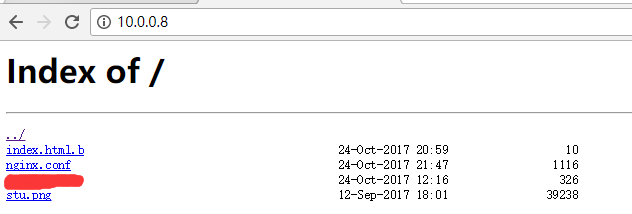Nginx服务编译安装、日志功能、状态模块及访问认证模式实操
系统环境
[root@web ~]# cat /etc/redhat-release CentOS release 6.9 (Final) [root@web ~]# uname -a Linux db02 2.6.32-696.el6.x86_64 #1 SMP Tue Mar 21 19:29:05 UTC 2017 x86_64 x86_64 x86_64 GNU/Linux
Nginx介绍
Nginx是一个开源的,支持高性能、高并发的WWW服务器和代理服务软件
nginx软件常见的使用方式或架构为:LNMP(linux nginx mysql php)
Nginx的特点或优势
- 支持高并发:能支持几万并发连接(特别是静态小文件业务环境)
- 资源消耗少:在3万并发连接下,开启10个Nginx线程消耗的内存不到200MB
- 可以做HTTP反向代理及加速缓存、即负载均衡功能,内置对RS节点服务器健康检查功能,这相当于专业的Haproxy软件或LVS的功能。
- 具备Squid等专业缓存软件等的缓存功能。
- 支持异步网络I/O事件模型epoll(Linux 2.6+)(绘图说明同步和异步)
大并发写操作;先写内存,再将内存数据存储到硬盘中---保证访问效率
大并发读操作;先写磁盘,再将磁盘数据存储到内存中---保证数据安全
总结:高并发-->资源消耗少-->功能多样(web服务/负载均衡/支持缓存)-->通讯模型先进(epoll)
Nginx编译安装步骤
一、解决nginx依赖包
需要的依赖:
pcre:兼容perl语言正则表达式,perl compatible regular expressions rewirte模块 参数信息(perl方式定义正则表达式)
openssl:https
注意:所有安装依赖软件,后面都要加上-devel

[root@web ~]# yum install -y pcre-devel openssl-devel 下载nginx [root@web tools]# wget http://nginx.org/download/nginx-1.10.2.tar.gz [root@web tools]# ll total 892 -rw-r--r-- 1 root root 910812 Oct 24 10:26 nginx-1.10.2.tar.gz
二、解压nginx、创建管理用户、配置nginx

[root@web tools]# tar xf nginx-1.10.2.tar.gz [root@web tools]# ll total 896 drwxr-xr-x 8 1001 1001 4096 Oct 18 2016 nginx-1.10.2 -rw-r--r-- 1 root root 910812 Oct 24 10:26 nginx-1.10.2.tar.gz [root@web tools]# cd nginx-1.10.2 [root@web nginx-1.10.2]# useradd -s /sbin/nologin www -M [root@web nginx-1.10.2]# id www uid=2223(www) gid=2223(www) groups=2223(www) [root@web01 nginx-1.10.2]# ./configure --prefix=/application/nginx-1.10.2 --user=www --group=www --with-http_stub_status_module --with-http_ssl_module --prefix:表示指定软件安装到哪个目录中,指定目录不存在会自动创建 --user/--group:nginx工作进程由哪个用户运行管理 --with-http_stub_status_module:表示启动nginx状态模块功能(用户访问nginx的网络信息) --with-http_ssl_module:启动https功能模块
三、编译&&编译安装
make && make install
给软件创建软连接文件,方便以后管理使用

[root@web application]# ln -s /application/nginx-1.10.2/ /application/nginx [root@web application]# ll total 4 lrwxrwxrwx 1 root root 26 Oct 24 10:51 nginx -> /application/nginx-1.10.2/ drwxr-xr-x 6 root root 4096 Oct 24 10:50 nginx-1.10.2
四、启动nginx服务

[root@web application]# /application/nginx/sbin/nginx [root@web application]# ps -ef |grep nginx root 15342 1 0 10:56 ? 00:00:00 nginx: master process /application/nginx/sbinnginx www 15343 15342 0 10:56 ? 00:00:00 nginx: worker process root 15345 12539 0 10:56 pts/0 00:00:00 grep --color=auto nginx
软件安装完目录信息
conf --- 软件配置文件保存目录
html --- 网站站点目录*
logs --- 日志文件保存目录
sbin --- nginx命令保存目录
conf目录中内容
nginx.conf --- nginx程序的主配置文件
nginx.conf.default --- nginx配置备份文件
因为初始化的nginx配置文件内有较多注释,影响对配置文件的修改,所以进行精简化配置文件
[root@web conf]# egrep -v "#|^$" nginx.conf.default >nginx.conf
nginx软件启动重启方法

启动方法(全路径) /applocation/nginx/sbin/nginx 停止方法(全路径+ -s 参数 接指令) /applocation/nginx/sbin/nginx -s stop 平滑重启方法(全路径+ -s 参数 接指令) /applocation/nginx/sbin/nginx -s reload 检查配置文件语法(全路径+ -t 参数) /applocation/nginx/sbin/nginx -t 查看怎么部署的(全路径+ -V 参数) /applocation/nginx/sbin/nginx -V
Nginx配置文件配置详解
在server模块下指定主页文件,可以指定自己写的主页,这里需要注意的是,主页文件要放到站点目录下

[root@web nginx]# cat conf/nginx.conf worker_processes 1; ##worker进程数量 events { worker_connections 1024; ##每个worker进程支持的最大连接数 } http { include mime.types; ##Nginx支持的媒体类型库文件 default_type application/octet-stream; ##默认的媒体类型 sendfile on; ##开启高效传输模式 keepalive_timeout 65; ##连接超时 server { listen 80; ##提供服务的端口,默认是80 server_name www.zxpo.top; ##提供服务的域名主机名 location / { root html/www; ##站点的根目录,相当于Nginx的安装目录 index index.html index.htm; ##默认的首页文件,多个用空格分开 } error_page 500 502 503 504 /50x.html; ##出现对应的状态码,使50x.html location = /50x.html { root html; ##指定对应的站点目录为html } } }
多个server模块堆在一个配置文件中比较乱,难以修改,可以将配置文件分为多个,一个nginx.conf为主,例如
创建一个exyra目录为存放不同站点的配置文件目录,将不同网页的server模块写成不同的配置文件,然后引用
http { include mime.types; default_type application/octet-stream; sendfile on; keepalive_timeout 65; include extra/www.conf; include extra/blog.conf; include extra/bbs.conf; }
Nginx使用
基于域名访问
在server模块中设置,server模块可以有多个,server_name,可以修改成不同的域名,如果是本地测试的话,记得host文件解析
server { listen 80; server_name www.zxpo.top; <- 修改虚拟主机域名名称 location / { root html/www; <- 修改虚拟主机站点目录 index index.html index.htm; }
基于端口访问
server { listen 81; <- 将端口换成81,进行测试 server_name bbs.zxpo.top; location / { root html/bbs; index index.html index.htm; }
检查
[root@web nginx]# netstat -lntup|grep nginx tcp 0 0 0.0.0.0:80 0.0.0.0:* LISTEN 15342/nginx tcp 0 0 0.0.0.0:81 0.0.0.0:* LISTEN 15342/nginx
基于IP访问
注意:采用基于IP配置虚拟主机,修改完配置文件后,需要重启配置文件,不能够采用平滑重启。
只要配置文件中,有关IP地址相关的改动,都需要进行重启nginx服务,不能够采用平滑重启。
改配置文件
server { listen 10.0.0.8:80; <-改成某个ip还有指定的端口 server_name www.zxpo.top; location / { root html/www; index index.html index.htm; }
然后重启
curl访问网站流程
[root@web ~]# curl -v www.zxpo.top <- 利用curl命令-v参数获取访问网站流程
a. 访问网站时首先需要根据域名解析获取到网站的ip地址,找寻网站的ip地址对应的服务器
b. 访问网站时其次需要根据请求建立连接的目标端口信息,找寻网站的相应服务端口是否存在
c. 访问网站时再次需要根据请求域名信息获悉相应的站点,找寻网站的相应站点目录下的资源信息
d. 访问网站时最后如果ip地址加端口信息都已找到,但没有找到对应的域名信息,会按照默认原则使用第一个虚拟主机作为默认访问的虚拟站点目录
Nginx共享文件web页面
当配置autoindex on参数以后,会显示站点目录文件列表信息:
1. 对于nginx服务可以识别解析资源,进行点击,会显示相应内容
2. 对于nginx服务不可以识别解析资源,进行点击,会直接下载
server { listen 80; server_name www.zxpo.com; location / { root html/www; <-或者在设置一级专门做共享的目录 index index.html index.htm; <-这里要在站点目录中把主页文件删除,否则会直接显示主页 autoindex on; }

查看Nginx状态信息配置
stub_status模块主要用于查看Nginx的一些状态信息
在主配置文件配置 log_format main……
http { include mime.types; default_type application/octet-stream; sendfile on; keepalive_timeout 65;
log_format main '$remote_addr - $remote_user [$time_local] "$request"' '$status $body_bytes_sent "$http_referer" ' '"$http_user_agent" "$http_x_forwarded_for"';
省略……
访问状态信息:

Active connections 客户端连接数
accepts 接收数值
handled 处理数值(通常跟接收值是一样的,但是限制值达到上限就例外了)
requests 客户端请求值
Reading 请求报文的连接数
Writing 响应
Waiting 等待请求的数量
说明:一般以上页面内容信息主要会被zabbix监控服务调取,形成图像信息;根据图像信息,从而判断nginx网站服务用户访问量情况
Nginx日志功能
|
Nginx日志变量 |
说明 |
|
$remote_addr |
记录访问网站的客户端地址;即源 ip地址 |
|
$http_x_forwarded_for |
当前端有代理服务器时,设置web节点记录客户端地址的配置,此参数生效的前提是代理服务器上也进行了相关的 x_forwarded_for设置可以记录用户真实的 IP地址信息 |
|
$remote_user |
远程客户端用户名称 |
|
$time_local |
记录访问时间与时区 |
|
$request |
用户的 http请求起始行信息 |
|
$status |
http状态码,记录请求返回的状态,例如:200,404,301等 |
|
$body_bytes_sents |
服务器发送给客户端的响应body字节数 |
|
$http_referer |
记录此次请求是从哪个链接访问过来的,可以根据referer进行防盗链设置即表示是哪个网站介绍过来的 |
|
$http_user_agent |
记录客户端访问信息,例如:浏览器、手机客户端等 |
|
在没有特殊要求的情况下,采用默认的配置即可,更多可以设置的记录日志信息的变量见: http://nginx.org/en/docs/http/ngx_httpJog_module.html |
|
错误日志信息
记录nginx服务运行异常情况信息
error_log的默认值为:
error_log logs/error.log error;
可以放置的标签段为(可以设置的区块):
main,http,server,location
参考资料:http://nginx.org/en/docs/ngx_core_module.html#error_log 。
说明:nginx官方文档查询信息如何使用,如何根据配置信息获取所在模块目录
配置文件中设置错误日志
error_log logs/error.log error;
访问日志信息
Nginx日志格式中默认的参数配置如下: log_format main '$remote_addr - $remote_user [$time_local] "$request" ' '$status $body_bytes_sent "$http_referer" ' '"$http_user_agent" "$http_x_forwarded_for"';
Nginx记录日志的默认参数配置如下:
access_log logs/access.log main;
配置文件中设置访问日志
http { include mime.types; default_type application/octet-stream; sendfile on; keepalive_timeout 65; log_format main '$remote_addr - $remote_user [$time_local] "$request"' '$status $body_bytes_sent "$http_referer" ' '"$http_user_agent" "$http_x_forwarded_for"'; access_log logs/access.log main;
……
日志信息说明
这是一条日志文件中的日志信息:
10.0.0.253 - - [25/Oct/2017:15:32:35 +0800] "GET /favicon.ico HTTP/1.1" 404 571 "http://www.zxpo.top/" "Mozilla/5.0 (Windows NT 10.0; WOW64) AppleWebKit/537.36 (KHTML, like Gecko) Chrome/60.0.3112.90 Safari/537.36" $remote_addr 10.0.0.253 客户端IP地址信息 $remote_user - 远程认证用户信息 [$time_local] [24/Oct/2017:23:19:29 +0800] 显示访问事件信息 $request GET / HTTP/1.1 表示显示请求行内容 $status 200 显示状态码信息(若日志中,状态码为304,表示用户端有缓存信息) $body_bytes_sent 10 响应保存主体内容大小 $http_user_agent 定义客户端以什么软件进行访问web服务器
Nginx日志切割方式
利用脚本切割
#!/bin/bash /application/nginx/sbin/nginx -s reload #先重启一次生成日志 mv /application/nginx/logs/access_www.log /application/nginx/logs/access_www_$(date +%F).log #然后改名 /application/nginx/sbin/nginx -s reload #再次重启重新生成新的
具体切割日志脚本
[root@www logs]# cat /server/script/cut_nginx_log.sh #!/bin/sh Dateformat=`date +%Y%m%d` Basedir= "/application/nginx" Nginxlogdir="$Basedir/logs" Logname="access_www" [-d $Nginxlogdir ] && cd $Nginxlogdir || exit 1 [-f ${Logname}.log ] || exit 1 /bin/mv ${Logname}.log ${Dateformat}_${Logname}.log $Basedir/sbin/nginx -s reload
logrotate方式切割

logrotate配置文件详解
/var/log/nginx/*.log { #/var/log/nginx/日志的存储目录,可以根据实际情况进行修改 daily ##日志文件将按天轮循 weekly ##日志文件将按周轮循 monthly ##日志文件将按月轮循 missingok ##在日志轮循期间,任何错误将被忽略,例如“文件无法找到”之类的错误 rotate 7 #一次存储7个日志文件。对于第8个日志文件,时间最久的那个日志文件将被删除 dateext #定义日志文件后缀是日期格式,也就是切割后文件是:xxx.log-20160402.gz这样的格式。如果该参数被注释掉,切割出来是按数字递增,即前面说的 xxx.log-1这种格式 # compress ##在轮循任务完成后,已轮循的归档将使用gzip进行压缩 delaycompress ##总是与compress选项一起用,delaycompress选项指示logrotate不要将最近的归档压缩,压缩将在下一次轮循周期进行。这在你或任何软件仍然需要读取最新归档时很有用 notifempty ##如果是空文件的话,不进行转储 create 640 nginx adm ##以指定的权限和用书属性,创建全新的日志文件,同logrotate也会重命名原始日志文件 sharedscripts ##表示postrotate脚本在压缩了日志之后只执行一次 postrotate [ -f /var/run/nginx.pid ] && kill -USR1 `cat /var/run/nginx.pid` endscript } ## postrotate/endscript:在所有其它指令完成后,postrotate和endscript里面指定的命令将被执行。在这种情况下,rsyslogd进程将立即再次读取其配置并继续运行。注意:这两个关键字必须单独成行
Nginx的location作用
进行策略控制

location = / { [ configuration A ] } location / { [ configuration B ] } location /documents/ { [ configuration C ] } location ^~ /images/ { [ configuration D ] } location ~* \.(gif|jpg|jpeg)$ { [ configuration E ] }
location表示位置的概念,类似于if,即满足什么条件,就做什么
控制访问网段,设置访问网段白名单和黑名单
[root@web01 www]# cat /application/nginx/conf/extra/www.conf server { listen 80; server_name www.etiantian.org t.org; location / { root html/www; index index.html index.htm; } location /AV/ { root html/www; index index.html index.htm; allow 172.16.1.0/24; ##允许内网网段访问 deny all; ##其余网段拒绝 } }
location匹配说明
|
不用URI及特殊字符组合匹配 |
匹配说明 |
|
location = / { |
精确匹配 / |
|
location ^~ /images { |
匹配常规字符串,不做正则匹配检查(优先) |
|
location ~* \. ( gif|jpg|jpeg ) $ { |
正常匹配,匹配后缀为gif|jpg|jpeg的 |
|
location /documents/ { |
匹配常规字符串,如果有正则,优先匹配正则 |
|
location / { |
所有location都不能匹配后的默认匹配 |
|
~ : 匹配内容区分大小写 ~* :匹配内容不区分大小写 ! :表示取反匹配 ^~ :表示当多个匹配同时存在,优先匹配^~内容 |
|
Nginx 的访问认证
修改nginx的相关配置文件
server { listen 80; server_name www.zxpo.top; location / { root html/www; index index.html index.htm; auth_basic "erlianzhang training"; auth_basic_user_file /application/nginx/conf/htpasswd; }
创建密码认证文件并进行授权
首先要下载httpd-tools软件
yum install httpd-tools -y
htpasswd的参数

[root@web application]# htpasswd -hlep Usage: htpasswd [-cmdpsD] passwordfile username htpasswd -b[cmdpsD] passwordfile username password htpasswd -n[mdps] username htpasswd -nb[mdps] username password -c Create a new file. 创建一个新的密码文件 -n Don't update file; display results on stdout. 不更新文件,显示输出结果 -m Force MD5 encryption of the password. 强制采用MD5加密密码 -d Force CRYPT encryption of the password (default). 强制采用CRYPT加密密码(默认) -p Do not encrypt the password (plaintext). 不加密密码(明文) -s Force SHA encryption of the password. 强制采用SHA加密密码 -b Use the password from the command line rather than prompting for it. 使用密码来自命令行,相当于免交互方式 -D Delete the specified user. 删除指定用户 On Windows, NetWare and TPF systems the '-m' flag is used by default. On all other systems, the '-p' flag will probably not work.
创建认证文件

[root@web www]# htpasswd -bc /application/nginx/conf/htpasswd lyq 123456 Adding password for user oldboy [root@web01 www]# cat /application/nginx/conf/htpasswd lyq:DVu6f44f2I81w <- 加密的认证文件自动设置密文
给密码文件授权,重启Nginx

[root@web www]# chown -R www.www /application/nginx/conf/htpasswd [root@web www]# chmod 400 /application/nginx/conf/htpasswd [root@web www]# /application/nginx/sbin/nginx -t nginx: the configuration file /application/nginx-1.10.2/conf/nginx.conf syntax is ok nginx: configuration file /application/nginx-1.10.2/conf/nginx.conf test is successful [root@web www]# /application/nginx/sbin/nginx -s reload
登陆测试




